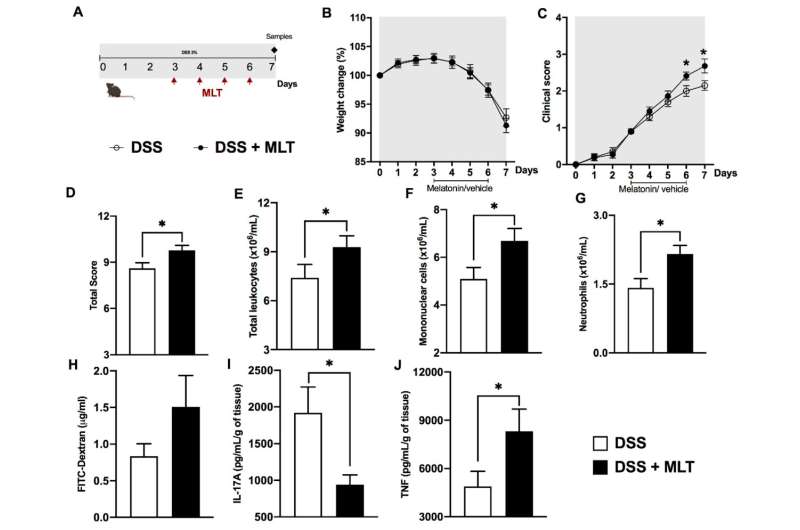This article has been reviewed according to Science X's editorial process and policies. Editors have highlighted the following attributes while ensuring the content's credibility:
fact-checked
trusted source
proofread
Study shows melatonin, commonly used to improve sleep, can aggravate bowel inflammation

An article published in the journal Microorganisms shows that melatonin, despite its antioxidant effects and role in regulating sleep cycles, can worsen inflammation of the intestine and impair the action of gut microbiota. This community of bacteria and other microbes is important to health, helping control digestion and benefiting the immune system. An imbalance of unhealthy and healthy microbes in the intestines may contribute to weight gain, high blood sugar, above-normal cholesterol and other disorders.
Melatonin is popularly known as the "sleep hormone" and is often taken as a so-called food supplement without a doctor's prescription by people with sleep problems.
"It's generally thought to be harmless. After all, it's a hormone and can help regulate sleep. However, our study shows that people should be careful about taking hormone supplements and that the ingestion of melatonin supplement can have adverse effects on health," said Cristina Ribeiro de Barros Cardoso, a professor of immunology and neuroimmunoendocrinology at the University of São Paulo's Ribeirão Preto School of Pharmaceutical Sciences (FCFRP-USP) in São Paulo state, Brazil.
Cardoso's laboratory conducts research into inflammatory bowel disorders, including Crohn's disease and ulcerative colitis. These disorders are immune-mediated, resulting from abnormal activity of the immune cells in overreacting to a pathogen, with destructive effects on the gut microbiome and severe clinical symptoms, such as abdominal pain, constant diarrhea, bleeding and fatigue.
Treatment entails suppressing or inhibiting the immune response in order to reduce the excessive inflammation that damages the intestine. Besides corticosteroids and immunosuppressants, treatment may involve immunobiological medications, which are more effective for moderate and severe cases but unaffordable for most patients. In Brazil, they are paid for only under specific circumstances by the SUS (Sistema Único de Saúde, as the national health service is known) or by health plans in the event of a court order.
"Our lab works to achieve a better understanding of these diseases and propose novel treatments that are more affordable," said Cardoso, who holds a degree in dentistry from the Federal University of Uberlândia (Minas Gerais state) and a Ph.D. in basic and applied immunology from USP, with a postdoctoral internship at Forsyth Institute, an affiliate of the Harvard School of Dental Medicine (USA).
Besides the problem of affordability, she added, many patients do not respond well even to the most advanced treatments and have to undergo surgery for removal of parts of the intestine. These invasive procedures have a highly negative effect on their quality of life. "For this reason, in recent years we have pursued novel therapeutic options, primarily based on immune response modulation or regulation," she said.
Cardoso and her group have years of experience in hormone research and recently began focusing on melatonin. "Look, I'm not saying by any means that melatonin doesn't have beneficial effects. On the contrary, in fact. There are few studies or reports pointing to adverse side effects," she said.
Melatonin can indeed act as an antioxidant and improve several physiological or pathological conditions. "We started out in this study with the assumption that we might be able to develop a novel treatment for Crohn's disease and ulcerative colitis, but to our surprise, we found exactly the opposite, and patients should be made aware of this danger," she said.
The study involved an experiment in which colitis was induced in mice, and they were treated with melatonin. Their condition became worse instead of improving. "It's important to stress that no human patients were involved in the study. The animals' bowel inflammation became much, much worse," Cardoso said.
"We then began trying to understand why. We found that melatonin had a positive effect on the disease if the effect on gut microbiota was ignored and the mice were treated with wide-spectrum antibiotics to eliminate all the bacteria."
The negative effect of melatonin, therefore, depends on the bacteria that live in the intestine and are also associated with inflammatory diseases of the region. Certain features of gut microbiota increase inflammation and dysregulate the immune system in response to treatment with melatonin, damaging the digestive system.
"What is the meaning of all this? I'd say it's that all that glitters is not gold. We should take great care with medications, hormone supplements or hormones offered as food supplements. You buy a 'food supplement' in a pharmacy and think it's not a drug, it won't alter anything in your body, it will only do good because after all it's sold as a food supplement, but it's not really that at all. It's a hormone, and regulation of the interaction between all hormones and the immune system is very delicate," Cardoso said.
ANVISA, Brazil's national health surveillance agency, has recently updated its information and rules on the sale of melatonin as a food supplement, but even so control is looser than for medications. "It's important to stress this because we talk about the need to take care, but people may think, 'Oh, but I'll just pop into the pharmacy and buy some, it's been approved by ANVISA.' True, but only when labeled as a food supplement, and what we're asking in the study is whether it's really a mere food supplement. What are the risks?" Cardoso said.
More information: Jefferson Luiz da Silva et al, The Microbiota-Dependent Worsening Effects of Melatonin on Gut Inflammation, Microorganisms (2023). DOI: 10.3390/microorganisms11020460



















